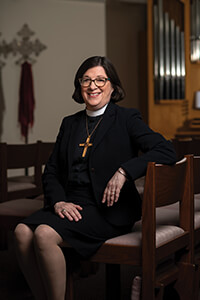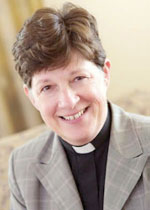Worship is the heart of all we do
April 20, 2015
There is a Seattle-based caffeinated beverage company that goes to great lengths to provide excellent customer service. Its campaign is to make itself everyone’s “Third Place.” “First Place” is home, “Second Place” is work and “Third Place” is the local coffeehouse. There is meticulous training for employees, relentless market research and creative adaptability employed by the company to retain customers.
Employees practice the “hand-off plane” where they are taught to make eye contact when handing over the vente mocha latte to the customer. This is so the customer will have a transformative experience while sipping a cup of joe. And it works. In a letter to thank the staff a woman wrote: “You are the hub of our week, the space of our regrouping,” and she went on to describe a multigenerational, multicultural, multi-socioeconomic community where she and her family found comfort and a sense of belonging.

This is our competition.
We are church. At the heart of what we do is worship, and at the heart of our worship is the crucified and risen Christ. Everything else we do is formed, nourished, sustained and transformed by our life as a faith community gathered around word and sacrament, abiding in the love of God. Without this intentional, regular communion with God and each other it’s not possible for us to speak an authentic word of hope to a broken world — the world God so loves.
When we gather for worship we hear God’s word of promise; we confess our helplessness; receive forgiveness; we pray; and we welcome new brothers and sisters through baptism, promising to support them in their walk in faith. We are fed with the bread of life and receive our Lord poured out for us. And then we are sent back into the world. Worship is essential for the church’s life and service.
But how much attention do we pay to the preparation and execution of our corporate worship? Is it the “hub of our week, the space of our regrouping”? Do we expect to have a transformative experience? The Third Commandment (Remember the Sabbath day, to keep it holy) and Martin Luther’s explanation (We are to fear and love God so that we do not neglect his word and the preaching of it, but regard it as holy and gladly hear and learn it) remind us that worship is central in the life of faith. Worship is not just another item on the list of programs and activities in a congregation. It is the heart.
Sometimes worship can become a sort of lived-in room — everything has become so familiar that we don’t notice the frayed furniture. What if we entered worship as if it were our first experience of it? What if we saw the congregation and the liturgy through the eyes of a guest? Is the building clean? Where is the real front door? Does anyone greet us? Is the bulletin easy to navigate? Where are the nursery and the restrooms? Are instructions for communion clear?
And what about the worship service itself? We are a liturgical church. There is a certain humility and beautiful communion in not trying to reinvent the service each time, but to join with brothers and sisters throughout the world and across the centuries. And please, please do not rewrite the creeds. It took the church a couple of centuries to come up with the Nicene Creed. Why do we think we can do better knocking it out on our laptop?
This has nothing to do with styles of music — there is a breadth of hymnody in Evangelical Lutheran Worship and related resources. Gospel, Bach, contemporary and world music are all powerful ways of hearing God’s word and singing praise. It’s good to be fluent in the musical vernacular of our communities and to try those of others.
Most of all we should come to worship expecting to be changed. We are touching, tasting, feeling, hearing and seeing the one who knows us and loves us completely. Our lives are restored. We are set free. Fed for the journey we are set loose to go in peace and serve the Lord. Thanks be to God.

